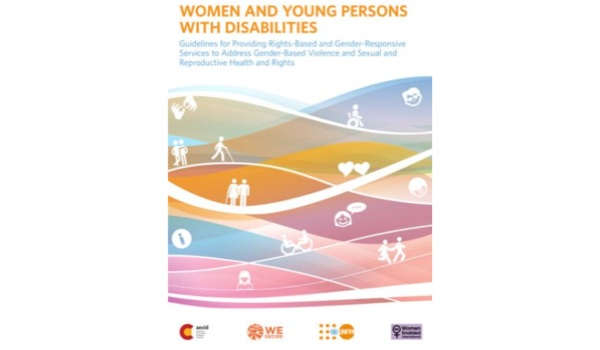
Women and Young Persons with Disabilities: Guidelines for Providing Rights-Based and Gender-Responsive Services to Address Gender-Based Violence and Sexual and Reproductive Health and Rights
by Women Enabled International and the United Nations Population Fund
The Guidelines offer practical and concrete guidance on the provision of inclusive and accessible services related to gender-based violence (GBV) and sexual and reproductive health and rights (SRHR) for women and young persons with disabilities. With over sixty examples of good practices and input from experts from around the world, the Guidelines bring together in one document resources on how to provide quality GBV and SRHR services to both women and young persons with and without disabilities. While the primary audience is GBV- and SRHR-related service providers, the guidelines are a valuable resource for all stakeholders – including those in government, international organizations, and non-governmental organizations – involved in designing, developing, implementing or advocating for services for people with disabilities. The recommendations are aimed at all settings, including low-, middle- and high-resource settings, as well as humanitarian emergency settings.
They make recommendations such as: “The essential principle that should guide all quality rights-based services for women and young persons with disabilities is: When in doubt, ask the person with the disability. In fact, the Convention on the Rights of Persons with Disabilities requires such consultation in the development and implementation of legislation and policies… [as] Women and young persons with disabilities are the experts on their own needs, the barriers they experience, and the accommodations they require for equal access to services.”
Examples given of work to achieve these ends include that of: 1) REDI, a grassroots disability organization in Argentina, who evaluated the extent to which Argentina’s laws, policies, and national plans realize the SRHR of women with disabilities in Argentina in a report entitled ‘Rights of Persons with Disabilities to Sexual and Reproductive Health: 20 Fundamental Questions on Public Policies of the Argentinian State.’ and 2) the Community Based Rehabilitation Network Ethiopia and Light for the World in Ethiopia partnered together on a local pilot project to tailor trainings and activities about SRHR and rights to the needs of young persons with intellectual disabilities and their families. Key lessons learned from the project included dismantle taboos regarding sexuality and persons with disabilities; resolve the service gap through training field workers; provide practical how-to techniques; involve family members; and provide trainings to both boys and girls.
DOWNLOAD THE GUIDELINES AT: https://womenenabled.org/wei-unfpa-guidelines.html. Accessible versions (DAISY, Epub, Easy Read) and French, Spanish, Chinese, and Arabic translations are forthcoming and will be available at UNFPA’s (https://www.unfpa.org/publications/women-and-young-persons-disabilities) and WEI’s websites shortly.



